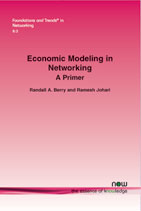Economic Modeling in Networking: A Primer
By Randall A. Berry, Electrical Engineering and Computer Science, Northwestern University, United States, rberry@eecs.northwestern.edu | Ramesh Johari, Management Science and Engineering, Stanford University, United States, ramesh.johari@stanford.edu
Abstract
In recent years, engineers have been increasingly called upon to have basic skills in economic modeling and game theory at their disposal for two related reasons. First, the economics of networks has a significant effect on the adoption and creation of network innovations, and second, and perhaps more importantly, engineered networks serve as the platform for many of our basic economic interactions today. This monograph aims to provide engineering students who have a basic training in economic modeling and game theory an understanding of where and when game theoretic models are employed, the assumptions underpinning key models, and conceptual insights that are broadly applicable.
Economic Modeling in Networking
Economic Modeling in Networking: A Primer is designed to provide engineering students who have a basic training in economic modeling and game theory an understanding of where and when game theoretic models are employed, the assumptions underpinning key models, and conceptual insights that are broadly applicable. In recent years, engineers have been increasingly called upon to have basic skills in economic modeling and game theory at their disposal for two related reasons. First, the economics of networks has a significant effect on the adoption and creation of network innovations, and second, engineered networks serve as the platform for many of our most basic economic interactions today. Despite these confluences, the typical engineering student does not garner economic training until later in their graduate career, if at all. This monograph takes the stance that basic economic understanding is a critical tool in the arsenal of the modern engineering student. Economic Modeling in Networking: A Primer is intended to help engineering students to work with economic models but also to cast a critical eye over such models. As such, it is also an ideal complementary text to a good introductory textbook or course on microeconomics or game theory
